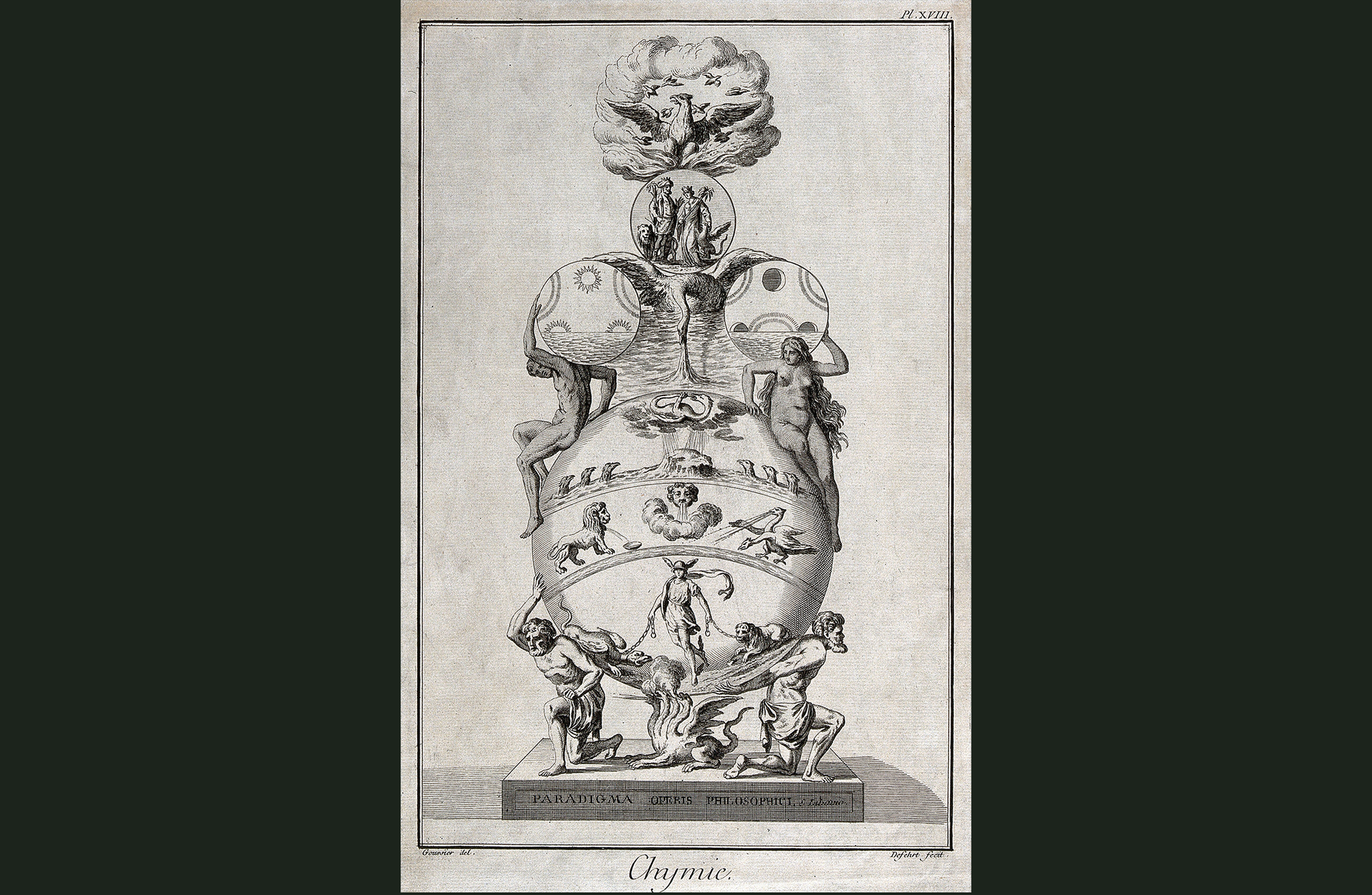Emblem representing the path to the philosopher's stone in alchemy. Etching by Defehrt, 1768, after L.-J. Goussier, after the frontispiece to a 17th century book by Libavius. / CC0 1.0 Universal
This month, I want to try something a little different. I’ve designed a Solo RPG, and I would love for you to play it. This is meant to be run without anyone facilitating the game, but you could very easily play it with a friend, if you so choose. I hope that at the end of the game, you will have been able to create a small tale of adventure, completely from a few random prompts, and that you will have found some enjoyment from it. Just remember, your journal entries can be as thorough or brief as you wish, but the more you let yourself dive in, the more the experience will give back to you.
The Young Alchemist
You are an alchemist’s apprentice. Your mentor has been tasked with brewing a potion for the Queen, but before she could finish, your mentor fell gravely ill. The task now falls to you to find the necessary ingredients and brew the Queen’s potion on your own.
The ingredients may be difficult to find; some might be exceptionally rare, or guarded by dangerous beasts. It is up to you to discover them, overcome the obstacles in your way, and figure out what kind of potion the Queen was looking for in the first place.
You’ll need:
- A deck of cards (jokers removed)
- A pad of paper or notebook and a pen
How to play
1: Name your alchemist
Record your alchemist’s name in your notebook. Additionally, record two memorable characteristics about them.
2: Gear up
Give your character one piece of equipment that’s useful, one that’s meaningful, and one that’s worthless. Write a sentence or two about how they found each piece of equipment and why they’re carrying it around.
3: Draw two cards
The first card represents the ingredient. Using the card’s suit, consult the table below for an idea as to what the ingredient might be:
Club: Something lost
Diamond: A mineral or gemstone
Heart: A living ingredient
Spade: Something magical
The second card is where the item may be found. Again, using the card’s suit, consult the table below to get a general idea of where the ingredient might be found:
Club: Hidden within some kind of puzzle
Diamond: In a dangerous natural area
Heart: Guarded by a monster
Spade: Held within a settlement or civilizationRecord these values in your journal. Discard the location card, but keep the ingredient card in a pile close to your journal.
Write a few sentences describing what kind of ingredient could be in the location drawn, and what type of effect it might have when added to a potion. Then, write a few more sentences about what your alchemist knows about the region they have to enter.
Take some time to write about how your alchemist might be feeling about the task ahead.
Imagine that your alchemist has traveled to the location where the ingredient is. Write about what kinds of physical sensations they may be experiencing as they find themselves at the entrance to the location.
4: Make a choice
If this is your first time here, continue on to Step 5.
At this point, you must make a choice: Collect the ingredient, or return home to brew the potion. If the total value of all ingredient cards drawn is equal to 30 or higher (Aces are worth 1, face cards are worth 10) you will be safe to return home, knowing that you have collected enough material to complete the potion. If the total is less than 30, you may still attempt to make the potion, but must rely on the Queen’s grace (more on that ahead).
You may find that your alchemist has lost too much to continue. Failure is a valid ending to this game. Record in your notebook the tragedy of this young alchemist’s life.
If you choose to go home now, skip ahead to Step 6.
Otherwise, continue on to Step 5.
5: Draw one more card
The third card is what your alchemist will lose as a result of undertaking the task of collecting the ingredient. Again, only the suit will matter:
Club: Your worthless item
Diamond: Your meaningful item
Heart: Some aspect of your health
Spade: Your useful item
If you draw a suit you have previously drawn, you instead lose a precious memory. Describe the loss of the item, health, or memory, and how your alchemist is impacted as it happens. Once the loss has been recorded, the ingredient is yours to keep for the rest of your journey.
Return to Step 3. When you are describing the next location, integrate how the loss suffered just now is affecting your alchemist.
6: Returning Home
Spend time writing a few sentences describing how your alchemist fares on their return trip home. Think about how the journey has affected your alchemist, and what they are most looking forward to, now that they are finally done with their quest.
Total the values of all collected ingredient cards. If the total is 30 or greater, you are able to brew a miraculous potion. Describe how your alchemist feels returning home successfully, and how they are treated by both their alchemist mentor and the Queen herself.
If the total value of your ingredients is less than 30, you will be relying on the Queen’s grace to see if she accepts the potion you’ve brewed with less than adequate ingredients. Draw one card and add it to the ingredient total. If your total now meets or exceeds 30, the Queen will accept your potion. If it doesn’t, the Queen will punish your alchemist appropriately.
You have one more card to draw. Before you draw this last card, take some time to write about how your character is feeling and what they are doing to get through the task of brewing this potion. When you draw the card, add it to your total to see if your alchemist succeeds (30 or above).
Write about either the relief or fear they experience when they receive the Queen’s final decision. How did they fail? How did they succeed? How much did they lose along the way?
This ends the story.
And that’s it. I would really enjoy hearing about where your adventures lead you. If you write them up in a Google Doc or something similar, I’d love to read them. Please send them along to president@tricityareagaming.org when you can. Until next time, happy adventuring <3
Brendan Quinn is the President of Tri-City Area Gaming, a 501(c)(3) nonprofit that promotes critical thinking skills with community-building events and supports game-based educational and charitable activities. He is an ASWB certified Therapeutic Game Master with over 20 years of GM experience.
Tri-City Area Gaming uses tabletop gaming as a framework for social interaction, education, and community building. They host nearly 100 events a year in order to bring folks together in a way that’s safe, friendly, and inclusive.
Check out Tri-City Area Gaming’s events and follow them on social media: tcag.carrd.co


